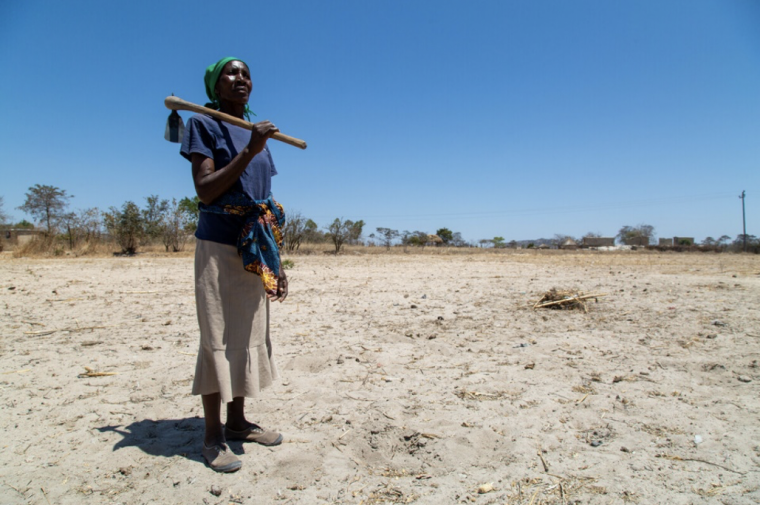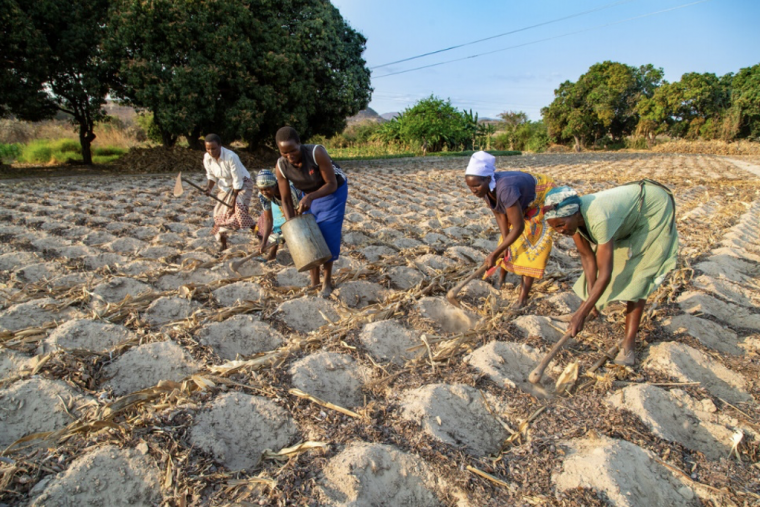Scorched Earth: equipping vulnerable women to survive drought

As a heatwave heads to the UK, and Indian cities battle with record temperatures, Christian Aid has released a report this week that highlights how the climate crisis is increasing the severity of drought in 10 of the world's major cities.
Drought is a present danger to some of the poorest people in the world. It impacts health, agriculture, economies, energy, and the environment. It robs families of the chance to farm and feed their families, it threatens lives and livelihoods. According to WHO, approximately 55 million people are affected by droughts every year.
Zimbabwe often falls victim to this damaging natural state and is an area where seven out of 10 women rely on farming to earn a living and provide for their families. But with no rain, growing food proves to be near impossible. Women are particularly vulnerable and often eat last and least, causing an even greater struggle to farm and look after their families.
Jessica Mwedzi lives in Chadanyika, Zimbabwe with her husband, six children, father-in-law and brother-in-law. She says, "They look up to me for food, clothing and blankets. It is a huge task. My children crave a decent meal, but I can't provide. It pains me to send them to bed hungry.
"One year, we had no rain. The scorching sun burnt my crops just as they were about to bloom. It was so painful and disheartening. More often than not we go to bed on an empty stomach, even failing to get mealie-meal to make porridge. If we go to neighbours or relatives, they tell you that they also don't have."
Jessica has recently joined Christian Aid's BRACT programme (Building Resilience through improving the Absorptive and Adaptive Capacity for Transformation). Through this project, Christian Aid and local partners work to help the most at-risk communities in Mutoko and Mudzi districts of Zimbabwe to prepare for and adapt to the changing climate, empowering vulnerable communities to grow drought-resistant crops, build storerooms to preserve food for the dry months, and learn new skills for alternative employment when agriculture fails.
BRACT is a five-year project, spanning 1 October 2017 to 30 June 2022. So far, thanks to the kind donations from supporters and the dedication and hard work of the communities in Mudzi and Mutoko districts, Christian Aid and its partners have helped over 27,000 people in Zimbabwe to stand strong and resilient to the climate crisis.
Among these people is 70-year-old Janet Zirugo, who has been married to her husband, John Zirugo, for 52 years. They live in Njani Village, Bondamakari Ward, Mutoko District. She is a mother of 10 children, a grandmother of 28 and a great grandmother of eight. Janet loves to sing and dance; she attends Apostle Church.
Janet says, "During that drought, with no harvests, and little food, seeing my children and grandchildren without enough to eat was heartbreaking, I thought they were going to die, it was such a distressing moment, we had to get relief food."

She continues, "When I gauged that food that I had prepared I knew right away that it was not enough. So I would let boys eat on one plate, and girls on another plate, but even so, I would still realise that some were not having enough food. I would give them my plate before I ate. I would just two handfuls just to survive, but I was content that my children had something to eat."
Janet was trained by Christian Aid local partner, Community Technology Development Organisation, on agriculture and sustainable farming techniques. She was supplied with seeds and encouraged to grow small grains as part of climate-smart agriculture. This has enabled her to diversify her food production, growing a variety of grains such as millet, sorghum, rice, quinoa, maize, groundnuts, and French beans. She's been able to provide enough food for her immediate and extended family as well as sell produce to local markets. Janet adds, "Using conservation agriculture that we have been trained, planting of small grains, we now realize that despite little rainfall, we can still harvest good crops".
Through the BRACT programme, Christian Aid also works with Silveria House, which provides training to young people in skills like welding and leatherwork, so they don't have to rely on farming to earn a living. This helps vulnerable women and men to earn a fair wage and helps protect their families from hunger.
Jerina Nyamukondiwa, her husband and their five children live in Chipfiko, Mutoko District and have benefitted from this programme. At the age of two, Jerina lost both her parents during the war in Zimbabwe.
Jerina is a hawker, vending tomatoes and other vegetables with her daughter to passers-by in a shopping centre along the highway near her home. However, vending has its challenges, drought affects her produce and Covid-19 has affected her business. She speaks of the difficulties of making ends meet and described one of her lowest points:
"There was a year when the challenge was so big and bad ... because there was no water, there was a drought that year. So, I did not work my garden which helps me get money. As a result, I could not send my child to school. That year it was a difficult one. It was a big challenge. It was tough!"
During droughts and at the onset of the pandemic and lockdowns, vending had not been forthcoming and there were days when the whole family had to go hungry.
When Jerina was introduced to the BRACT programme, it offered a range of courses, and she chose welding, which was inspired by her husband, who is also a welder. Together with her group of Kubatana Steelworkers, they gained soft skills, such as business management and marketing, as well as hands on skills and being supported with start-up kits.
Jerina changed her life. "Sometimes you ask yourself...what shall I do? Sometimes you cry alone. You wipe away the tears, but we continued in strength saying things will be alright. Life will change. I derived strength from looking at my family, my children.
"And there is great change indeed and truly. What I am now is not what I was. And more so I am seeing that there is change because in the last three years I have change within me, and I can point to two or three things which I have acquired, my achievements, which I have held."
The kind donations of Christian Aid supporters across the UK have allowed this work to continue, helping to transform the lives of Janet, Jane and Jerina. This week is Christian Aid Week which is focusing on the climate crisis in Zimbabwe. If you would like further information or to donate, please visit the website.











